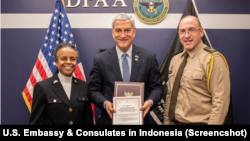The mission of the U.S. Defense POW/MIA Accounting Agency is to recover U.S. service members who died or became missing in combat and return them to their families.
The agency works in 45 nations to investigate, recover, identify, and return 81,000 missing personnel from conflicts spanning from World War II through the Persian Gulf wars. The work begins, the director of the agency Kelly McKeague explained, with research and analysis and migrates through field excavations:
"Then ultimately if we do find remains, we bring them back to one of two laboratories where our scientists will identify them and hopefully repatriate them to their loved ones."
Many countries cooperate with the United States, including those with whom the U.S. has tense relations, like China and Russia. One country has refused to cooperate since 2005:
“We have 7,500 missing from the Korean War; 5300 are in North Korea. … North Korea is the only one that uses this as a weapon, knowing how important it is to us, because theirs was always conditions based: ‘If you want this, then you need to talk about taking denuclearization off the table. If you want this, you need to remove all economic sanctions, all trade embargoes."
Director McKeague said North Korea stands in stark contrast to another nation.
"Vietnam, 10 years after the war in the midst of economic sanctions, in the midst of trade embargoes, no diplomatic relations with the United States, approached the U.S. and said, ‘We will help you with this."
Director McKeague noted that in Vietnam his agency oftentimes employs villagers to help his staff.
“Our teams have never encountered bitterness, hostility, or regret – and by the way, most of these people probably lost loved ones in the war.”
Over time, said Director McKeague, “Those villagers began to ask their government. ‘What about our loved ones?’” Vietnam has now passed a law establishing a capability like the United States’, and the United States is helping them.
Other countries, particularly in Asia, have modeled themselves after the U.S. mission.
“This is something that the United States does and a commitment that we make not only to the service members who made the supreme sacrifice in war, but it’s also to their families,” said Director McKeague. It is, as he has often called it in the past, “a sacred mission and a moral imperative.”

















